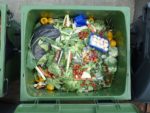Sustainable Technology: Q&A with TODAY App Creator

Born from a desire to bring big changes to the world via our ever increasing reliance on technology, Seb Berry created the TODAY App, offering users the chance to take on small sustainable challenges that have big impacts on our planet. We got the chance to speak with Seb about sustainability, solutions and the big challenges in today’s society. Q: What inspired you to create the TODAY App? A: For me, the first thing was to try and figure out how to bring the world’s most monumental challenges into some kind of framework that feels personal and relevant. We live with one …













